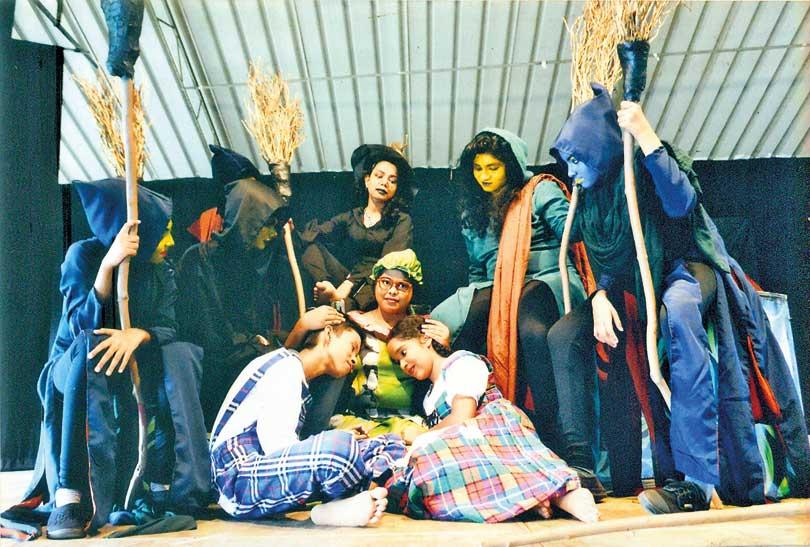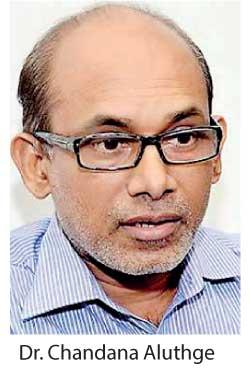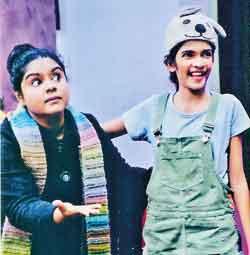Reply To:
Name - Reply Comment

 In a world where the competitiveness of the education system is increasing day by day and high academic expectations are piled on young minds, students who hurry from school to class with no break and no time to engage in any other activities except their academic activities are subjected to ‘educational tiredness’ or ‘student burnout’. This causes students to undergo a lot of stress which can be quite unhealthy in the long term and cause them to perform poorly in their academics. To provide relief for such students and to produce content, healthy and well rounded individuals, the Government initiated the ‘State Children’s Drama Festival’ in 1996 and has been organized annually since then. The 23rd State Children’s Drama Festival is taking place this year.
In a world where the competitiveness of the education system is increasing day by day and high academic expectations are piled on young minds, students who hurry from school to class with no break and no time to engage in any other activities except their academic activities are subjected to ‘educational tiredness’ or ‘student burnout’. This causes students to undergo a lot of stress which can be quite unhealthy in the long term and cause them to perform poorly in their academics. To provide relief for such students and to produce content, healthy and well rounded individuals, the Government initiated the ‘State Children’s Drama Festival’ in 1996 and has been organized annually since then. The 23rd State Children’s Drama Festival is taking place this year.
Organised by the Ministry of Housing, Construction and Cultural Affairs, the Department of Cultural Affairs, the Arts Council of Sri Lanka and the State Advisory Council of Drama, this Festival’s objectives are to promote creativity of children in every corner of Sri Lanka, provide recognition to talented child dramatists, script writers and directors, produce emerging young artistes in the field of performing arts and give rise to confident, determined, ambitious citizens devoid of anti-social elements. This Festival has produced popular child artistes like Kokila Pawan Jayasooriya and has been the foundation for many scriptwriters, according to Ruwini Manamperi, an official attached to the Department of Cultural Affairs.
This festival has seen plays directed by eminent directors such as Somalatha Subasinghe, Chandrasena Dassanayake, Wijerathna Pathiraja to name a few, and Manamperi believes that when children are exposed and given a chance to participate in such plays- they are able to develop their creative talents.
 This year, the Drama Festival is presented in two sections; the open section and the limited section. School plays will be shown in the Limited Section and plays by non-school groups will be shown in the Open Section. The Festival will present a vast array of dramas in Sinhala, Tamil and English.
This year, the Drama Festival is presented in two sections; the open section and the limited section. School plays will be shown in the Limited Section and plays by non-school groups will be shown in the Open Section. The Festival will present a vast array of dramas in Sinhala, Tamil and English.
The State Children’s Drama Festival consisted of three rounds, Manamperi states that applications for this festival was published on print and electronic media. Applications were closed on 30th May 2019 and the first round consisted of script selection. The scripts that were selected were performed at Regional Level and 28 plays were selected to be performed at the ongoing Festival. “The speciality of this year is that for the very first time, we had the Regional Level competitions in the second round because for all these years, we’ve held the second round as a Provincial Level competition. In order to give scope for more talented performers, writers and directors to be recognized, we held this year’s second round competitions in Regional Level.” noted Manamperi. The first and second rounds were held within a span of four months and for the Regional Level competitions, all the competitors except from the Northern and the Eastern Provinces were invited to perform in Colombo. The teams that were performing were given an allowance to cover the costs incurred for their transportation and stay in Colombo. The jury travelled to the Northern and Eastern provinces to judge the Regional Level performances. This year the jury consists of Professor Patrick Ratnayake, Professor Mangalika Jayatunge and Professor Sri Prasanthan. Manamperi also revealed that around Rs. 90,000,000 was spent in organising this Festival along with the Awards Ceremony,
The Awards’ ceremony will take place on 18th October 2019 at Nelum Pokuna Mahinda Rajapakse Theatre, Colombo from 5p.m. onwards under the patronage of Minister of Housing, Construction and Cultural Affairs, Sajith Premadasa. It was stated to the Daily Mirror, that about 18 awards will be awarded at the Awards’ Ceremony including the Award for the Best Play.
Speaking to Dr. Chandana Aluthge, a Senior Lecturer in Economics at the University of Colombo and a veteran practitioner in Children’s Theatre attached to the Somalatha Subasinghe Playhouse, he said “This is a commendable event because different schools and theatre groups can produce and showcase them but it is a competition which I am not very much in favour of because children already have too much competition in their lives and the spirit of theatre is not to compete but to complement and to share. We should inculcate the spirit of working as a team in children and the children should also be able to appreciate the work of other teams. This is how we can build up a good society in the future.”
 When asked how the authorities could develop the Festival in a way that could build up the true spirit of drama, Dr. Aluthge stated that more policies should be implemented so that high quality children’s theatre could be produced and nurtured. He suggested that the participants, script writers, directors be exposed to high quality children’s theatre by getting down such theatre groups from Sri Lanka and abroad, and giving opportunity for teams in the Festival to also participate with them in various productions. “This way we can share the creativity and progression will be seen because all these years you show and you forget, there is no opportunity to showcase and get other’s ideas and constructive criticism which is important for the development of these participating teams.”
When asked how the authorities could develop the Festival in a way that could build up the true spirit of drama, Dr. Aluthge stated that more policies should be implemented so that high quality children’s theatre could be produced and nurtured. He suggested that the participants, script writers, directors be exposed to high quality children’s theatre by getting down such theatre groups from Sri Lanka and abroad, and giving opportunity for teams in the Festival to also participate with them in various productions. “This way we can share the creativity and progression will be seen because all these years you show and you forget, there is no opportunity to showcase and get other’s ideas and constructive criticism which is important for the development of these participating teams.”
Dr. Aluthge also stated that the competition could be beneficial in a way if it helped for the participants to perform their drama outside of the Festival. He suggested that the authorities could take the 5 best dramas and take them around Sri Lanka, making them perform at different parts of the island sharing their creativity with the other schools and individuals, which will help in getting better recognition for them. He also stated that some schools perform without the basic peripheral facilities and children are given the daunting task to perform drama without the peripheral facilities. “Theatre should be incorporated in a more practical manner by providing basic facilities and by encouraging theatre as a part of life.” He also suggested that more creative people should be in the organising committee. He added that Drama is a powerful medium to bring about a change in society.
Dr. Aluthge was happy to note that the Tamil plays which have the least exposure, have considerably developed over the years in the Festival but he said that English plays performed need more development when they are compared to English plays performed at various other drama festivals and competitions in the country.
Ruwini Manamperi urged the general public especially parents, teachers, educators and the youth to attend the Festival and encourage the creative talents of the children. She stated that Drama helps to alleviate the stress and burden caused by the competitive education system and the Festival would help inculcate a love for theatre for those on stage and the audience.
Dr. Aluthge recommended that the audience watch these plays with a rational mind and think in a rational manner and for teachers and parents alike to encourage and cultivate a love for theatre in the younger generation as the future belongs to those with creative minds, those who can think out of the box and resolve issues in a creative manner and Drama will inculcate these qualities in the young minds, when guided well.
26th September 2019
5.00pm-5.30pm:
Anuradhapura Central College- ‘Rajakeeya Palliya’
5.45pm-6.15pm:
Lyceum International School, Ratnapura- ‘Wicked Hearts’
6.30pm-7.00pm:
Suresh Madushan (Open University, Nawala)- ‘Eka Magic Thoppiyak’
27th September 2019
5.00pm-5.30pm:
Don Fredrick Maha Vidyalaya- ‘Rookada Pettiya’
5.45pm-6.15pm:
Sachitra Rahubadda-
‘Wings of Love’
6.30pm-7.00pm:
Saman Chandana- ‘Sundaravahini’
28th September 2019
5.00pm-5.30pm:
Viharamahadevi Balika Vidyalaya- ‘Salmal Landa’
6.15pm-6.45pm:
Gamini National School-
‘Sithumge Sithuvili’
7.00pm-7.30pm:
Sumana Balika Vidyalaya-
‘Sindu Kiyana Eran Kumari’
7.45pm- 8.15pm:
St. Joseph’s College, Anuradhapura- ‘Hari Raja Nari Raja’